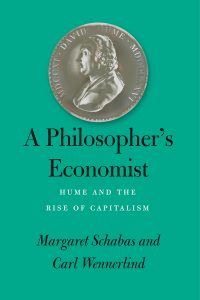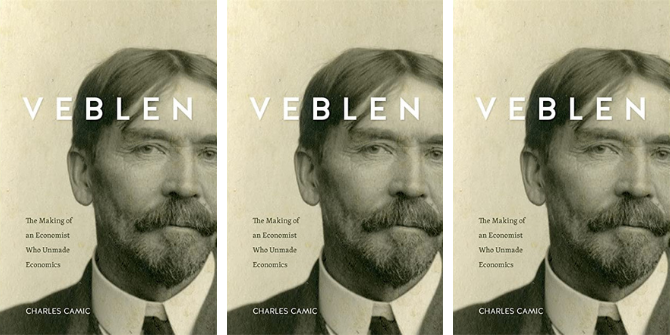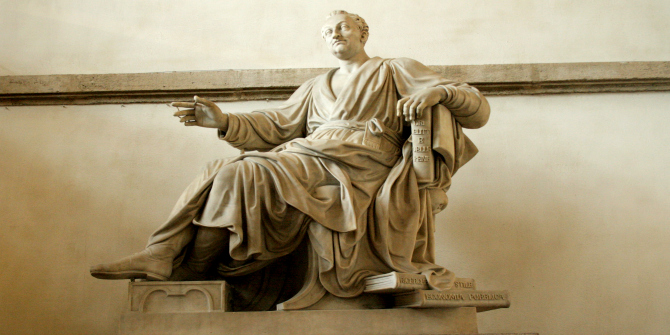In A Philosopher’s Economist: Hume and the Rise of Capitalism, Margaret Schabas and Carl Wennerlind offer a new study that fills a gap in scholarship on David Hume, connecting his economic thought to his philosophy and showing the central place of Hume’s economics in his life and work. This is a well-researched and artfully written volume, finds Mark G. Spencer, that will leave readers with a much richer understanding of David Hume, his world and ours.
A Philosopher’s Economist: Hume and the Rise of Capitalism. Margaret Schabas and Carl Wennerlind. University of Chicago Press. 2020.
 Find this book (affiliate link):
Find this book (affiliate link):![]()
‘There is as yet no monograph in English devoted to a comprehensive study of Hume’s economics, let alone one that connects this body of thought to his philosophical tenets,’ write our authors in their Preface to A Philosopher’s Economist. ‘This book fills that gap’ (xii). They are right; their exceptional study is a welcomed contribution. A Philosopher’s Economist fills a gap in David Hume scholarship, and accomplishes much more besides. Along the way, many longstanding interpretations are challenged.
Margaret Schabas and Carl Wennerlind tackle their task in a monograph divided into seven chapters. Chapter One sets the biographical scene, highlighting ‘the sense in which economic ideas and policies pervaded Hume’s entire adult life, in his publications and correspondence as well as his actions’ (30). Their approach suggests that Hume’s ‘stints in Bristol [as a merchant’s assistant] and on the Continent as a young man, and in government service in Paris and London in his fifties, which served as bookends for his life of letters, were in fact integral to his lifelong identity as an economist and not, as many commentators have supposed, tangential or idiosyncratic’ (8). Hume’s early life — one might add — was not bereft of commercial concerns either, as Roger L. Emerson has shown. Hume’s biography matters.

Chapters Two and Three flesh out Hume’s ‘science of economics’. Hume, we find, was less of a Newtonian than some have maintained. He also thought ‘we are more likely to detect fallacious inferences in the moral sciences than in the physical sciences’ (63). Hume’s evidence was often gleaned from the pages of history, we learn in Chapter Two. ‘A man acquainted with history may, in some respect’, wrote Hume in a passage our authors quote, ‘be said to have lived from the beginning of the world, and to have been making continual additions to his stock of knowledge in every century’ (68). Chapter Three, ‘Hume on Property and Commerce’, unpacks Hume’s conclusion that commercial nations tended to be ‘both the happiest and the most virtuous’ (89).
Chapter Four situates Hume’s economic thought in the context of his broader concerns with moral improvement. As Hume put it in ‘Of the Rise and Progress of the Arts and Sciences’:
Thus industry, knowledge, and humanity, are linked together by an indissoluble chain, and are found, from experience as well as reason, to be peculiar to the more polished, and, what are commonly denominated, the more luxurious ages. (114)
It is in that context that Hume’s praise of middling-sort merchants makes sense. And it is why he could write that ‘The same age, which produces great philosophers and politicians, renowned generals and poets, usually abounds with skillful weavers, and ship-carpenters’ (132). ‘We cannot reasonably expect’, postulated Hume in another memorable line, ‘that a piece of woollen cloth will be wrought to perfection in a nation, which is ignorant of astronomy, or where ethics are neglected’.
Chapters Five and Six present Hume’s treatment of money, banking, international trade and public finance. On these topics the man of letters wrote ‘theory with concrete policy recommendation in mind’ (142), including for Scotland. Hume discovered the ‘specie-flow mechanism’ (144), building on Thomas Mun and others. He ‘was strongly committed to any methods that would promote the “universal diffusion and circulation” of money’ (162). And he advocated for low interest rates, while appreciating that money was a ‘complex phenomenon’; it had ‘a will of its own’ (176). Hume thought, as did his American friend Benjamin Franklin, that free commerce between countries — not a ‘jealousy of trade’ — would increase wealth and foster global peace. An unmanageable public debt put all at risk, however.
A concluding, seventh, chapter provides a survey of Hume’s ‘imprint’ on economics in his time and later. Part of Hume’s impact was second-hand, through his best friend’s book — Adam Smith’s An Inquiry into the Nature and Causes of the Wealth of Nations (1776). Hume’s influence is traced to nineteenth- and twentieth-century economists as divergent as John Maynard Keynes, Friedrich Hayek and Milton Friedman, among many others.
Few readers of this book will challenge that Schabas and Wennerlind ‘demonstrate that Hume was engaged in thinking and writing about economics for his entire adult life and that his contributions are extensive and significant’. At the core of the volume’s textual evidence are Hume’s fifty moral, political and literary essays, including the twelve essays in Political Discourses (1752). But all of Hume’s major philosophical and historical writings are referenced. Some scholars may resist the authors’ strongest claim: ‘An inquiry into the ideal economic conditions to promote political stability and peace more strongly connects Hume’s entire corpus of writings, from his Treatise on through to his History of England and posthumous Dialogues, than anything drawn specifically from his epistemology or metaphysics. We do not make this claim lightly’ (13). Their book also shows that Hume’s histories were central — more than his abstract philosophy — to Hume’s goals.
Most of Hume’s relevant writings are tapped. One that is overlooked is Hume’s suppressed review of Volume Two of Robert Henry’s History of Great Britain (1774). There, Hume drew attention to Henry’s account of Anglo-Saxon ‘commerce, shipping, and coin’. He even reproduced Henry’s comparative ‘Table of the Names of the Anglo-Saxon denominations of Money, and of real Coins; with the weight of each of them in Troy grains, and value in the present money of Great Britain’. Noting this piece — one of Hume’s last — may not have altered the interpretations offered in A Philosopher’s Economist. But, it could have bolstered some of them while adding additional colour to Hume’s keen interest in commodities and currency. Other relevant sources from Hume’s Scottish context go unnoticed, too. Revising his History of England, Hume found reason to cite — several times — Adam Anderson’s (1692?-1765) An Historical and Chronological Deduction of the Origin of Commerce . . . containing a History of the Great Commercial Interests of the British (2vols, 1764). So, Anderson’s ‘History of Commerce’ deserves mention in this account of Hume’s economic thought.
As with any study that covers so much, A Philosopher’s Economist has the occasional slip. Listing some, in the order in which they appear in the book: firstly, it is claimed that Hume ‘befriended’ (28) the historian Catharine Macaulay. That is a stretch. Hume was civil in the lone letter he was obliged to write to her. He neither admired nor supported her History, and did not become a friend. Secondly, the American Revolution became a ‘full-blown war’ in 1775, not in 1773 (42). Third, Hume’s friend and fellow historian William Robertson is described as a ‘fellow philosopher-economist’ (117). He was neither a philosopher nor an economist. Fourth, our authors write that ‘David Raynor argues convincingly’ for Hume’s authorship of Sister Peg, ‘a work that had mistakenly been attributed to John Millar’ (246, note 19). Adam Ferguson, not John Millar, was the previously attributed author. Fifth, we are told, too, that ‘Hume’s first volume [of history] on the early Stuarts was entitled The History of Britain (1754). Because sales were poor outside of Edinburgh, he changed the title’ (251, note 57). That stated reason for the changed title is highly speculative. Also, the original title was The History of Great Britain. Perhaps in a new edition the authors may wish to revise some of these blemishes, and others that mar their endnotes and bibliography. Quibbles aside, this is a good book.
A Philosopher’s Economist is a serious piece of scholarship that is well-researched and artfully written. A charming feature of the volume is that its two authors are sometimes set in opposition, one with the other. Why did Hume think economic output increased when money flowed into a country from abroad? ‘We will consider two different interpretations,’ they write. ‘One, which Carl Wennerlind favors’ (154) and ‘Another interpretation, favored by Margaret Schabas’ (156). What are the authors’ competing interpretations? Readers curious to know will have to consult this fine volume. When they do, they cannot but come away with a much richer understanding of David Hume, his world and ours.
Note: This review gives the views of the author, and not the position of the LSE Review of Books blog, or of the London School of Economics. The LSE RB blog may receive a small commission if you choose to make a purchase through the above Amazon affiliate link. This is entirely independent of the coverage of the book on LSE Review of Books.
Image Credit: David Hume statue on Royal Mile, Royal Mile, Edinburgh, Scotland, UK. Photo by K. Mitch Hodge on Unsplash.








1 Comments